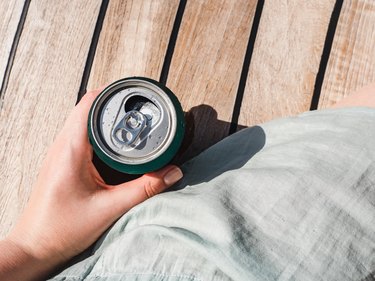
Soft drinks are popular for a reason — they're bubbly, refreshing and a quick solution for that mid-afternoon sweet tooth. But they can also be full of empty calories that could sabotage your health goals. Soda without high fructose corn syrup might be a better option.
Tip
Diet drinks with zero calories, such as Diet Coke, Diet Pepsi and Coke Zero, all contain artificial sweeteners instead of fructose.
Video of the Day
Fructose in Soda
High fructose corn syrup (HFCS) is a central ingredient in many traditional soft drinks, including Coca-Cola, Pepsi and Sprite. It's what gives your drink a sweet taste, but it's also what accounts for the majority of their calorie load. According to the Food & Drug Administration, HFCS is created by adding enzymes to corn starch, which converts the glucose sugar into fructose — a higher-glycemic molecule.
Video of the Day
Fructose is naturally occurring in lower quantities in fruits and some vegetables. In whole foods, it's combined with fiber, vitamins and minerals to balance out the sugar content, but in HFCS, the pure fructose provides no real health benefits. Instead, it converts very quickly into sugar in the bloodstream, spiking your blood sugar and creating the unfortunate "sugar crash" you sometimes get after consuming sweets.
Certain types of soda without HFCS are marketed as being healthier than their traditional counterparts. While they may have fewer calories, they're not always an ideal option because of the other added ingredients.
Soda Without HFCS
To find out if your soda contains fructose, there's an easy solution — check the label and ingredients list. If the drink contains zero calories, you can be sure it's a soda without HFCS. On its Products Facts website, the Coca-Cola Company lists several sodas without HFCS, such as Diet Coke, Fanta Zero and Sprite Zero.
Diet sodas typically use artificial sweeteners to cut down on calories. Mayo Clinic asserts that there's no credible evidence to suggest that these sweeteners, such as aspartame, cause cancer.
However, diet sweeteners were shown in a November 2018 study published in the journal Molecules to affect the gut microbiome, as well as to potentially contribute to the onset of Type 2 diabetes, according to a study featured in the January 2013 issue of the American Journal of Clinical Nutrition. These findings suggest that the diet versions of soft drinks aren't necessarily healthier than traditional soda beverages.
Certain sweeteners, such as stevia, are marketed as being healthy alternatives to sugar. But is stevia soda really that different from regular soda? It doesn't spike your blood sugar, and as ACE Fitness describes, it is made from the leaves of a tropical herb. In small quantities, it is likely fine — but very few long-term studies have been done on stevia's effects. Consume it in moderation rather than thinking of it as a miracle sugar substitute.
What About Coke Zero?
Diet Coke isn't the only type of alternate soda on the market. The Coca-Cola Company also markets Coke Zero, a diet soft drink with zero calories and zero grams of sugar. According to the company's website, Coke Zero is intended to taste just like the real thing — without the calories. Diet Coke, on the other hand, has a slightly different flavor and a "lighter taste."
For the most part, diet sodas use aspartame or sucralose to add sweetness, even though the flavor profiles of each drink might be slightly different. This list includes Sprite Zero, Diet Mountain Dew and RC Cola Diet.
If you're hoping to cut down on calories, these alternatives might be better for you — but like most processed foods, they should never be consumed in excess. Decide for yourself how much of these beverages you want to consume and talk to your doctor if you're concerned that diet soda could be having a negative effect on your goals.
- U.S. Food & Drug Administration: "High Fructose Corn Syrup Questions and Answers"
- Mayo Clinic: "I Drink Diet Soda Every Day. Could This Be Harmful?"
- Molecules: "Measuring Artificial Sweeteners Toxicity Using a Bioluminescent Bacterial Panel"
- American Journal of Clinical Nutrition: "Consumption of Artificially and Sugar-Sweetened Beverages and Incident Type 2 Diabetes in the Etude Epidémiologique Auprès des Femmes de la Mutuelle Générale de l'Education Nationale–European Prospective Investigation Into Cancer and Nutrition Cohort"
- ACE Fitness: "The Truth About Stevia—The So-Called "Healthy" Alternative Sweetener"